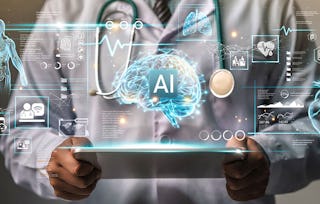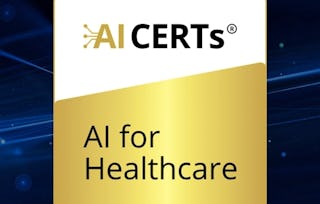Artificial intelligence is redefining healthcare by improving diagnosis, accelerating research, and supporting clinical decision-making. This course explores how advanced AI technologies such as natural language processing (NLP), generative AI, and computer vision transform medical practice, data analysis, and patient care.

AI Technologies in Healthcare
Ends soon: Gain next-level skills with Coursera Plus for $199 (regularly $399). Save now.

AI Technologies in Healthcare
This course is part of Artificial Intelligence for Healthcare Specialization


Instructors: Ramesh Sannareddy
Included with
Recommended experience
What you'll learn
Identify key AI technologies in healthcare, including NLP, generative AI, and computer vision.
Explain how advanced AI models process clinical text, patient data, and medical images.
Analyze healthcare datasets to design and evaluate AI models using guided Jupyter labs.
Create an integrated AI solution combining NLP, generative AI, and computer vision tools.
Skills you'll gain
Details to know

Add to your LinkedIn profile
November 2025
See how employees at top companies are mastering in-demand skills

Build your subject-matter expertise
- Learn new concepts from industry experts
- Gain a foundational understanding of a subject or tool
- Develop job-relevant skills with hands-on projects
- Earn a shareable career certificate

There are 4 modules in this course
In this module, you will explore advanced natural language processing (NLP) techniques used to extract meaningful insights from clinical text. The module begins by examining how NLP transforms unstructured medical notes into structured data that supports clinical decision-making. You will learn how transformer-based models such as BERT, BioBERT, and ClinicalBERT enable key tasks like entity recognition and information extraction. Through guided labs, you will build end-to-end NLP pipelines that preprocess and structure clinical information for real-world applications. You will also explore how NLP powers automated medical coding, clinical documentation, and decision support systems in healthcare workflows. The module concludes with a look at key implementation challenges, including data privacy, model integration, and workflow alignment, preparing you to design NLP solutions that enhance accuracy and efficiency in healthcare.
What's included
7 videos4 readings3 assignments5 plugins
In this module, you will explore the use of generative AI in healthcare to enhance clinical reporting, decision support, and patient engagement. The module begins by introducing large language models (LLMs) and advanced prompting techniques, demonstrating how these models can be adapted and fine-tuned for medical applications. You will learn how generative AI produces structured radiology and pathology reports, supports clinical decision-making, and generates personalized treatment recommendations. Through hands-on labs, you will build systems that automate medical report generation (Lab 5) and develop conversational AI chatbots for patient education and triage (Lab 6). The module also covers best practices for evaluating the accuracy, clinical utility, and ethical considerations of AI-generated content, equipping you to implement generative AI solutions that improve efficiency, safety, and patient-centered care in healthcare settings.
What's included
5 videos2 readings3 assignments3 plugins
In this module, you’ll explore how computer vision and multimodal AI are revolutionizing medical imaging and diagnostics. You’ll learn how deep learning models such as CNNs and Vision Transformers detect diseases, identify anatomical structures, and enable applications like surgical guidance and patient monitoring. You’ll also examine how multimodal AI combines imaging data with clinical notes and lab results to enhance diagnostic accuracy. Through case-based examples, you’ll analyze model architectures, workflows, and evaluation methods, as well as key deployment factors like performance, regulatory standards, and workflow integration. By the end of this module, you’ll be able to evaluate and design AI-driven imaging workflows that improve clinical accuracy and patient outcomes.
What's included
5 videos3 assignments4 plugins
This final module integrates advanced AI technologies learned throughout the course to address a comprehensive healthcare challenge. You will develop a multimodal AI solution combining natural language processing for clinical text analysis, generative AI for medical content creation, and computer vision for diagnostic imaging. The project emphasizes real-world clinical application, requiring learners to build an end-to-end pipeline that processes diverse healthcare data types, generates actionable insights, and presents findings in a clinically relevant format suitable for healthcare professionals and stakeholders.
What's included
1 video2 readings1 assignment1 peer review1 discussion prompt2 plugins
Earn a career certificate
Add this credential to your LinkedIn profile, resume, or CV. Share it on social media and in your performance review.
Offered by
Explore more from Machine Learning
 Status: Free Trial
Status: Free Trial Status: Preview
Status: PreviewNortheastern University
 Status: Free Trial
Status: Free Trial Status: Preview
Status: PreviewAI CERTs
Why people choose Coursera for their career




Frequently asked questions
No extensive coding knowledge required. The labs use pre-written Python code in Jupyter Notebook that you'll review and run to understand how healthcare AI models are built, trained, and tested. The focus is on understanding the process, not writing code from scratch.
The course integrates ethical and responsible AI principles across every module. As you explore NLP, generative AI, and computer vision, you’ll examine real-world issues like data privacy, bias in clinical models, and responsible use of AI-generated content. Through guided labs and the final project, you’ll learn to design AI systems that are not only technically advanced but also clinically reliable, explainable, and aligned with ethical standards in healthcare practice.
Yes! Throughout the course, you’ll complete guided Jupyter labs that let you apply NLP, generative AI, and computer vision techniques to real healthcare datasets. In the final project, you’ll build an end-to-end AI healthcare solution that integrates these technologies, such as processing clinical text, generating medical reports, and analyzing diagnostic images. This project helps you translate what you’ve learned into a realistic, industry-relevant implementation scenario.
More questions
Financial aid available,
¹ Some assignments in this course are AI-graded. For these assignments, your data will be used in accordance with Coursera's Privacy Notice.





